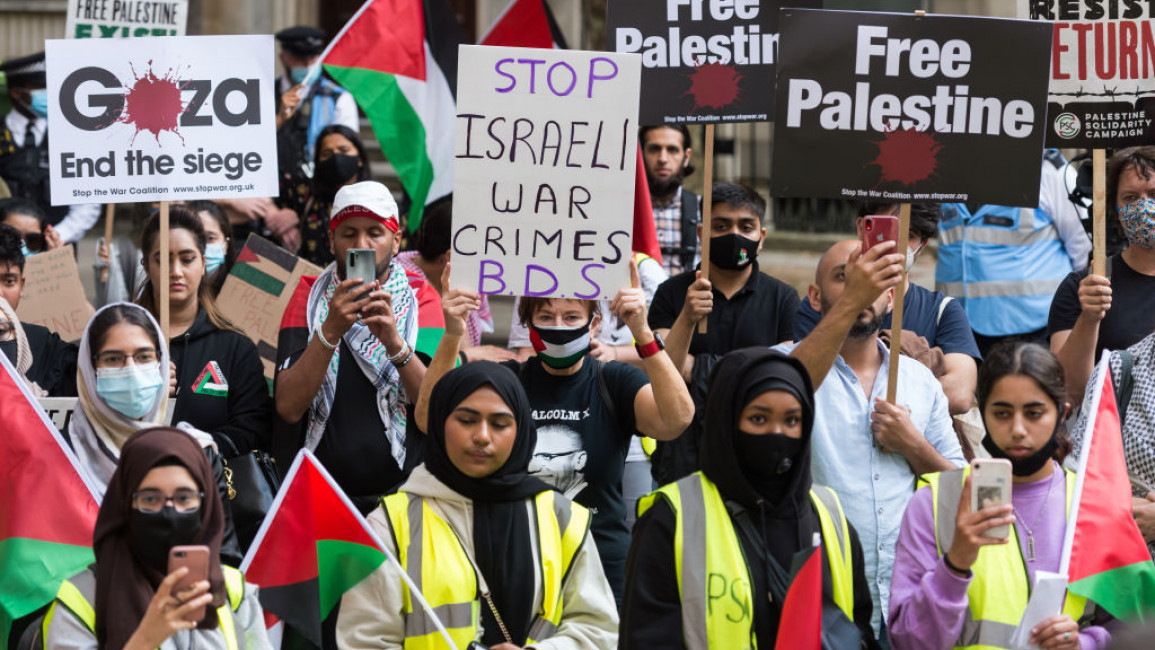Outrage as UK MPs hear zero Palestinian witnesses on anti-boycott bill
Campaign groups have expressed outrage after a panel of British lawmakers examining the government's controversial anti-boycott bill this week did not hear evidence from any Palestinians, whose rights will likely be affected by the legislation.
The proposed law, officially called the Economic Activity of Public Bodies (Overseas Matters) Bill, seeks to prevent local councils and other public bodies from engaging in the Palestinian-led Boycott, Divestment and Sanctions (BDS) movement against Israel.
A cross-party committee of MPs heard oral evidence from lawyers, human rights organisations, Jewish community bodies, and pro-Israel groups on Tuesday and Thursday – without one Palestinian witness present.
"It is outrageous that not a single representative of Palestinian civil society nor the Palestine Solidarity Campaign (PSC), which leads BDS campaigns here in the UK, has been invited to give evidence to place the proper facts on the record," PSC director Ben Jamal told The New Arab.
"If the committee intends to offer the bill any proper and serious scrutiny then it will act to remedy this deficit and not be complicit in the erasure of Palestinian voices."
The New Arab could not verify whether any Palestinians had been invited to speak before the committee, which is expected to report by Thursday next week. However, this news outlet was unable to identify any giving oral evidence this week.
'Anti-Palestinian racism'
Emily Hilton, UK director of the Jewish group Diaspora Alliance, said not including any Palestinian organisation in the proceedings shows a level of "anti-Palestinian racism".
Approached for comment, committee chair and Labour MP Sir George Howarth said the role he and his Conservative co-chair, Dame Caroline Dinenage, play is to ensure proceedings are conducted in line with the rules of the House of Commons.
"Chairs of public bill committees maintain strict impartiality as regards the content of the committee's deliberations and take no part in any discussions about selection of witnesses except to ensure the rules of the House are followed, as they were on this occasion," he added.
The UK's communities department, which is responsible for the anti-boycott bill, declined to comment on decisions made by a parliamentary committee.
But Chris Doyle, director of the Council for Arab-British Understanding (Caabu), said it was "quite extraordinary that once again Palestinian voices are ignored".
The main target of the bill is the BDS campaign against Israel, which Communities Secretary Michael Gove has claimed "leads directly" to anti-Semitic incidents. BDS co-founder Omar Barghouti told The New Arab in July that the bill is "extremely repressive" and that his movement opposes all forms of racism, including anti-Semitism.
But the proposed law would also prevent public bodies from taking economic action against other countries, with the government believing public bodies shouldn't be "pursuing their own foreign policy agenda".
A coalition of 70 civil society organisations – including the PSC, faith groups, and trade unions – oppose the bill under the banner "Right to Boycott". They have said the bill would hamper a wide range of campaigns connected with the arms trade, climate justice, and more.
'Deeply concerned'
Aimee Shalan, chair of the British Palestinian Committee advocacy group, said her organisation was "deeply concerned" by the convening of the committee of MPs examining the legislation.
"We have noted with alarm that this committee is predominantly comprised of individuals known for their support of Israel," she said.
"The committee's composition, coupled with the absence of Palestinian representation, raises significant questions about the inquiry's credibility and legitimacy."
The anti-boycott bill "infringes upon the rights of Palestinians" and "encroaches upon the fundamental civil liberties enjoyed by all British citizens", Shalan said, adding that it should be "unequivocally rejected in its entirety".
As part of routine declarations of interest, 10 of the 19 committee members said they had been on trips with or funded by Labour Friends of Israel or its counterpart in the ruling Tory party, Conservative Friends of Israel (CFI).
Witnesses who spoke before the committee this week include representatives of CFI, UK Lawyers for Israel, British Jewish communal body the Board of Deputies, the World Uyghur Congress, local government, and trade unions.
Andrew Whitley, chair of the Balfour Project, a group that describes itself as advocating peace and justice for both Palestinians and Israelis, also gave oral evidence. So too did Richard Hermer and Stephen Cragg, lawyers who have previously authored legal opinions that raise human rights concerns with the anti-boycott bill.
Pro-Palestine groups including the PSC, Caabu and Jews for Justice for Palestinians have submitted written evidence, an option open to everyone.
'Pernicious and worrying'
Yasmine Ahmed, Human Rights Watch's UK director, spoke against the bill when she came before the panel on Thursday.
"I'm a lawyer and I've been working in this jurisdiction for a number of decades now, and I can say that I have never read a piece of legislation that is as badly worded as this," she said.
"It is ambiguous. It completely runs… coach and horses through ESG [environmental, social, and governance] responsibilities and business and human rights responsibilities, and I think it's a very pernicious and worrying piece of legislation."
Ahmed appeared alongside Amnesty International UK's economic affairs programme director Peter Frankental, who said his organisation doesn't take a view on BDS but supports people's rights to advocate for it.
"Anyone who advocates for BDS should be able to do that without being tarred with the brush of racism [or] anti-Semitism," he added.
The anti-boycott bill is currently at the committee stage in the Commons. It will then proceed to the report stage and crucial third reading vote.
After clearing the UK parliament's lower house, it will need to pass the House of Lords before it can become law.



